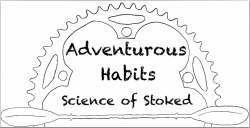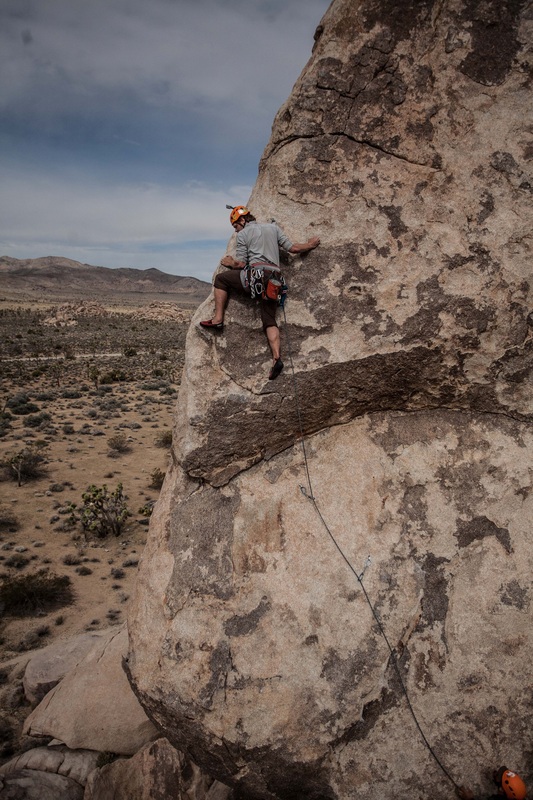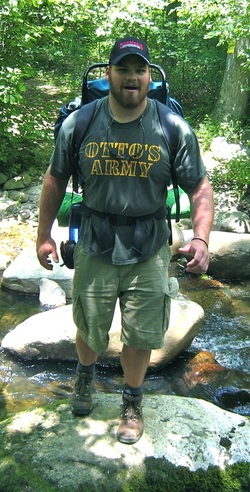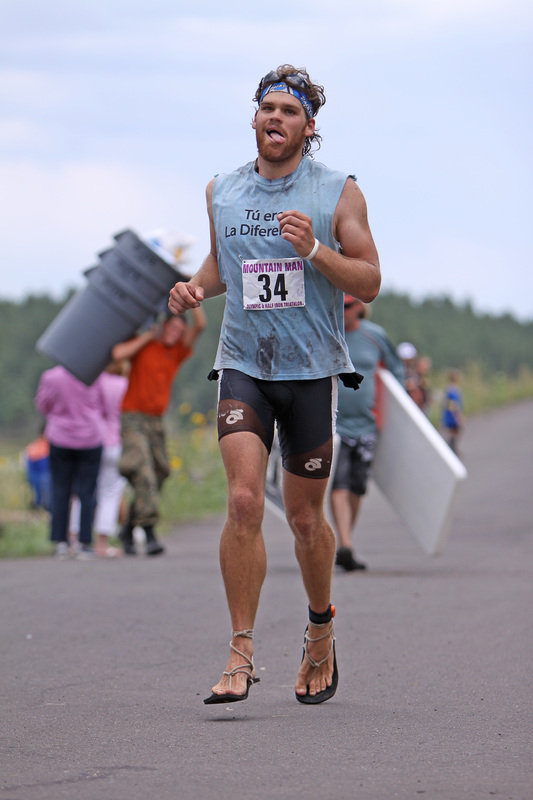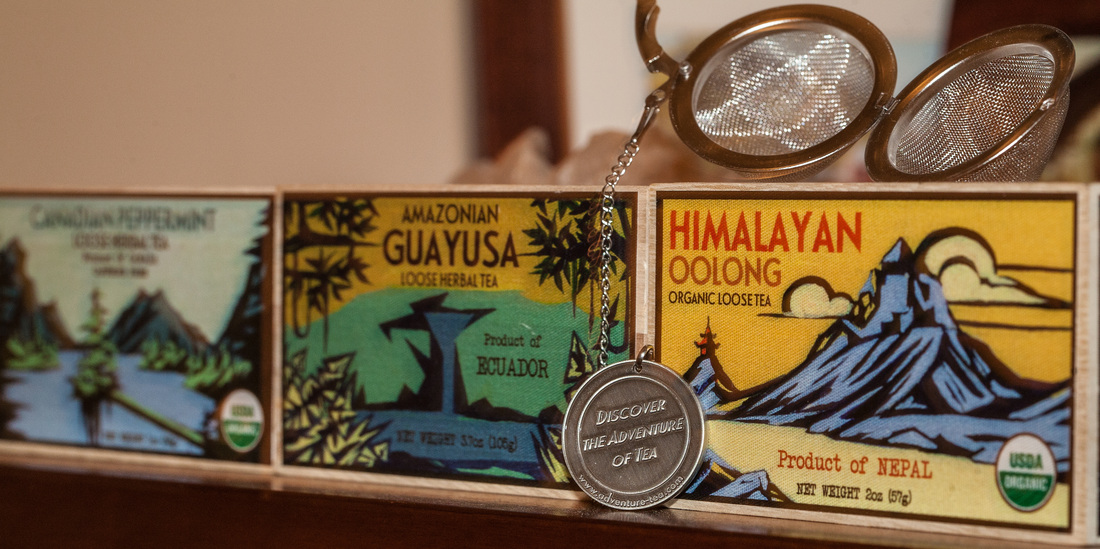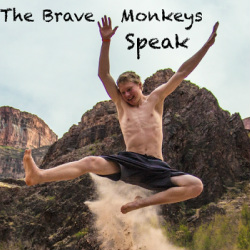Episode 032:
Music by Big Rain courtesy of Mevio's Music Alley.
032 | Stress Mastery through Adventure
Have you ever climbed or shredded on mountain bikes with those people who - by some act of ultimate willpower and control - never bat an eye at stuff that makes you wish you had worn your brown pants that day?
I have encountered a lot of those people. And I always wanted to figure it out - what the Hell is their secret? Are they born with a genetically-predisposed aptitude for risk? With the ability to calmly handle anything you throw their way?
The recent research suggests that while we can indeed be born with a wide range of reactivities to dangerous situations (I talked about this last episode, What adventures are you wired for?), we also have the ability to develop mental toughness through practice and lifestyle design. Surprisingly, developing it may even help us to live longer, healthier lives.
Stress. Quick - what does the word make you think of first? Work? Drudgery? Relationships? Heart attacks? (yes, it has come to my attention that heart attacks are caused by stress potentially as much as by dietary factors.) Ughhh. Stress can be a good thing - it can help us grow. But today, it seems that the word is only associated with the long-term, catabolic and insidious stress we find in so many modern workplaces.
Last week we talked about resilience, both personal and societal. How can we as individuals and as a community learn to respond to unwanted change in a way that allows us to continue living our core purposes?
I mentioned that we would do a couple of episodes really diving into some of the science behind how to develop resilience and live a stoked life. This is one of those. What happens to us, biologically, when we are stressed? How is it that stress causes heart attacks? How can we learn to mitigate the stress response in our bodies to live healthier, longer, more productive, more awesome lives?
Let’s break into it.
When someone says ‘I’m stressed,’ what they are referring to is a set of conditions in their body that came on in response to some external or internal stimulus. Perhaps their company is laying folks off left and right, and they fear they may be next.
The set of conditions that they are feeling in their body are a totally normal response to threats. If we go back to how we, as humans, evolved, lay-off’s weren’t a huge concern for cave men. Instead, a bear or lion might have been our biggest concern, or a rival tribe. These stimuli would require a great physical effort, so the stress response evolved to cause a rapid shift away from the state of everyday affairs in our bodies and brains to a state of emergency, allowing us to run or fight for our lives. Cool stuff - and it saved our asses out there on the plains. In the workplace though? Well, let’s get to that in a minute.
The stress response in the human body occurs in four stages - the last stage being the differentiator between ‘good stress,’ or eustress, and ‘bad stress’ that makes us weaker rather than stronger.
The first two stages involve electrical signals and are thus extremely fast. First, a small portion of the brain called the amygdala must register the stimuli (‘that’s a bear!’) and assign it emotional significance (‘I don’t like bears because they are dangerous’) before sending it out to other regions of the brain. This process takes milliseconds.
The second step is for the message to be sent to the body’s visceral organs - the heart increases it’s rate, pumping more blood and increasing blood pressure in case we have to sprint away. The extra blood is sent towards major muscle groups in our thighs and arms. At the same time, blood vessels in the stomach constrict, stopping digestion since there is no need for it lest the lion actually catch us. The blood shunted away from the stomach can result in the feeling of butterflies. Tiny arteries in the skin also constrict causing the skin to be clammy and pale - if the skin was lacerated in the fight this would help to slow bleeding. The skin sweats even in anticipation of physical exertion while water is conserved by stoping salivation, resulting in a dry mouth.
All of this occurs in less than a second and can prove extremely useful in getting away or fighting a threat; the downside, though, is it takes a TON of energy. There needs to be a way to fuel the process for a longer amount of time, and this is where step three comes into play.
The third step in the stress response is no longer electrical - it is chemical, which means it takes much longer for it to occur - on the order of seconds to minutes. The chemicals enter the body in the form of hormones like epinephrine (adrenaline) and sustain the focused attention and energy in the body.
The fourth and final stage in the stress response involves threats that last longer than a simple fight-or-flight situation. To deal with this sort of a sustained effort, the body secretes increasing amounts of “the big gun” of stress response - cortisol.
Cortisol is a catabolic hormone - it is capable of breaking down energy stores in our body so that we can use them immediately by blocking the effects of insulin and turning fat and muscle cells into free fatty acids and amino acids, which typically get sent to the liver to be converted into glucose so that our body can get immediate energy. It inhibits digestive enzymes to further slow digestion, and it inhibits the production of growth hormone (which can actually stunt the growth of young adults exposed to stress). Similarly, it blocks the effects of testosterone and suppresses the reproductive tract. Finally, cortisol is an incredibly powerful anti-inflammatory which, in combination with endorphins released can dull pain.
As a result, cortisol is capable of producing invigorating effects on the longer scale of minutes to hours... or even days. And this is where the problem lies - the effects of cortisol are capable of saving us from quite a bit of danger in the short term, but sustain the effects of cortisol for too long and let it reach too high of levels, and we may as well guarantee our long-term demise.
Unfortunately, our bodies treat threats in the form of a fight and in the form of workplace stresses the same. Ever gotten butterflies and sweaty palms before giving a speech? Even more unfortunate is that workplace stress tends to always be long-term.
So let’s talk about some of the effects of chronic exposure to cortisol, and then we will finish up with some of the current research on ways to become resilient to stress.
Cortisol has been shown to effect memory and thinking - remember our discussion of the amygdala - the part of the brain that gives emotional meaning to things? Cortisol can help to imprint and store memories of threatening stimuli in the amygdala, which allows those memories to be called upon in other times of threat to see if there is a match. The result is that under high levels of cortisol, we increasingly remember events that were stored under its influence - which typically aren’t pleasant memories. Perhaps we recall the ex- that cheated on us or a mountain bike crash that required a hospital visit. These negative thoughts also lead to a negative take on risks, which can lead to risk aversion (we’ll talk later about how taking positive risks changes our biochemistry in an awesome way). Once in this state, negative rumors (I heard I am going to be laid off next!) take hold easily, further elevating cortisol levels.
This in combination with another hormone released in the brain along with cortisol called CRH creates anxiety and what is called anticipatory angst - a general fear of the world. One of the unfortunate results of this state can be ‘learned helplessness’, where a person will give up on the idea that they can control their own future. Does this sound like some 9-5, stressed employees you know or have known?
Many people exposed to chronic stress find themselves with colds and flus often because of cortisol’s effect on the immune system, with gastric ulcers because of the blood shunted away from the digestive tract, with drug addictions because of cortisol’s effect on dopamine, even with ED because of the reduction in testosterone. But perhaps most common of all, people find themselves with an increased risk of heart disease. This starts with the fact that the heart rate is increased so as to supply more blood to the extremities (so you can run or fight), but the arteries in the interior of the body close down as to stop excess bleeding if wounded.
The extra pressure from the increased heart rate and constricted arteries cause tears in the artery walls to occur, which when patched by white blood cells, form plaque. Eventually, a buildup of plaque leads to a clog... and, well, I think you know what happens from there.
So what do we do? Can we have the best of both worlds - a job (perhaps even a stressful job that makes LOTS of money) and still not be phased by stress?
I think you know what I’m going to say. The answer is yes. Recent research is also proving this to us.
It turns out that the physiological and psychological elite - think Alex Honnald or Conrad Anker here - don’t even need cortisol much at all to manage stressful situations. Instead, their bodies are able to rely on another little-known stress-response system in the body - the vagus nerve.
The vagus nerve is the largest nerve in the body, emerging from the brain stem and heading all the way down into the core of the body, ending in the gut.
Now, this nerve has a whole host of what I would consider to be unbelievable talents that we are just beginning to learn about. The Vagus nerve can do everything from modulating the tone of our voice to slowing our breathing and heart rate. Perhaps even more interestingly, the part of the brain stem that it connects to controls our facial muscles, which allows the vagus nerve to link our gut feeling, heart feeling, and lungs to our voice tone and facial expression.
It is this same linking function of the vagus nerve that allows us to have ‘gut feelings’. Some experts like Michael Gershon have even called this connection ‘the second brain’.
But of more relevance to our topic, the vagus nerve, much like a downhill mountain biker feathering the brakes to modulate his speed, can slow our heart rate and breathing. This vagal brake is being feathered, slowing our heart rate down, most of the time - after all, there is no reason to have a high heart rate while reading, writing, or relaxing.
Now, if during the day you are faced with a fight-or-flight situation - a brawl or something - your body will produce all of the stress hormones we talked about previously. But not for something more minor - let’s say asking the boss for a raise. Instead of going into full fight or flight mode, the vagus nerve can simply release its brake a bit, allowing your heart to speed up and the minor issue to be dealt with without going into full alarm mode.
The physiological elite - those folks who never seem to be affected by fear or risk - they simply have such excellent vagal tone that even during high-stress situations, they can simply release the vagal brake to push through the task rather than launching into a full, cortisol-driven fight or flight mode.
So how can we increase our own vagal tone and ability to laugh in the face of stress?
Well, it turns out that since the vagus nerve is directly connected to the heart, vagal tone itself can be measured with - guess what - Heart Rate Variability. I’ve talked about this before. I’ll also put a link into the show notes about it. By training your heart rate variability, you can increase your vagal tone - your ability to deal with the small stuff for what it is - the small stuff. I can’t tell you how transformative training my Heart Rate Variability has been for my mountain biking, climbing, and life.
So speaking of that, how else can we become resilient to stress?
Well, for one, we can try to limit major causes of stress - novelty, uncertainty, or uncontrollability. But let’s be real - who isn’t going to face one of those things at some point. It would be a pretty boring life without those.
So instead, we can become more resilient to stress. And it has been shown that, funny enough, resilience to stress comes from experiencing stress. It’s just that the stress we experience has to be acute. It has to last for a short time period. Just like a muscle gets stronger when you stress it by doing squats and then let it rest, so does our stress resilience get stronger when it gets worked and then rested.
So what can you do to expose yourself to stress? Well, for one, take cold showers. It has been shown that in rats who regularly undergo the stress of swimming in cold water that they are able to down-regulate the stress response by relying on releasing the vagal brake in conjunction with adrenaline rather than cortisol, and that they end up being more resilient to future stresses of different natures. Scientists like Dr. Dienstbier goes so far as to make a case for how people who have developed cold tolerance may also have increased emotional stability.
And finally, of course, a way to increase your stress tolerance is to get out there. Climb. Scare yourself. Mountain bike. Skydive. Try something new. You just may find your stress-resilience growing stronger. You just may find yourself becoming a changed person.
Next time I’d love to get into another benefit of both HRV and getting out there on adventures - the increased aptitude for getting into a flow state - a state of optimal performance. But until then, go on and get out there. And of course, let me know what you’ve been getting yourself into.
